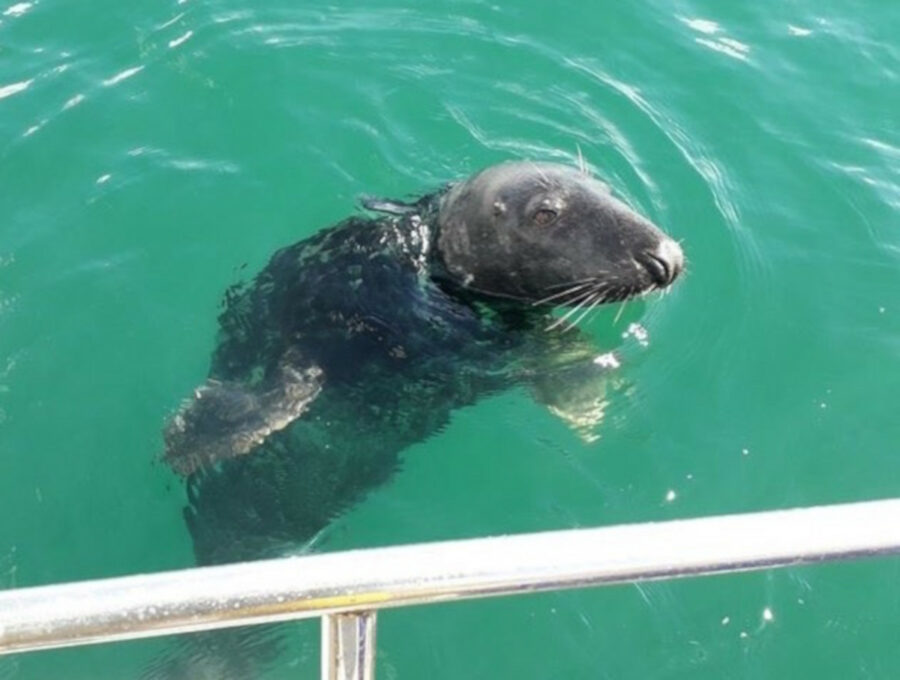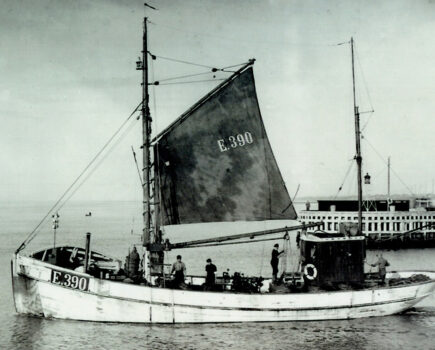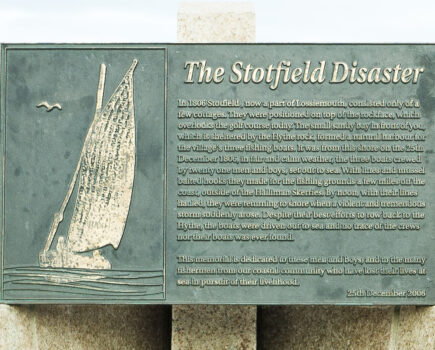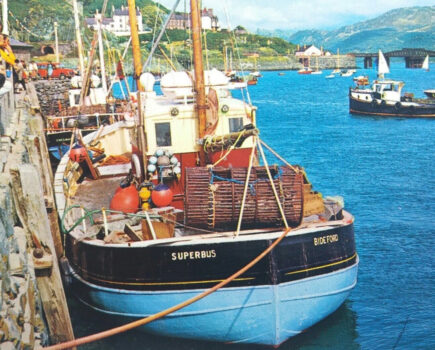Though many fishermen have compassion for marine mammals, it rarely extends to the British grey seal.
Over the years, I have witnessed huge financial losses to fishermen from the ever-growing seal population in British waters.
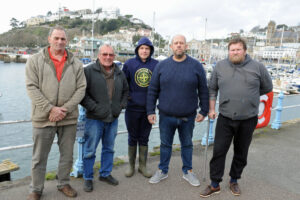
The Torquay fishermen: left to right – Trevor Parnell, Clive Baker, James Corbett, Darren Corbett and Matthew Ould.
Here in Cornwall, there are huge losses to the netters, and considerable bait losses to the potters, yet grey seals hardly ever fall foul of their trickery and rarely get caught in nets.
Are they intelligent enough to become ‘attached’ to a boat (or group of boats) for free meals? Definitely. Do they have a marine predator? No.
So seals have little to fear, and the result is dire for UK inshore fishermen. Although control by culling was once allowed, the seal is now a protected species, and any report of fishermen killing seals would have huge negative impacts upon the industry. Yet many inshore fishermen are facing bankruptcy, and no government support is in place.
Recently I had a phone call from Torquay fisherman Trevor Parnell, describing how the future of his business is in the balance.
Having sold what was left of his nets, Trevor does not know where to turn; he can stay with hook and line fishing for species such as mackerel, but the seals are eagerly ripping those fish from the line – to such an extent that with the use of high breaking-strain monofilament line, ‘it may only be a matter of time before a hook catches into my clothing or hand and I will be pulled overboard,’ he said.
Some of the Torquay fishermen have taken part in a research project looking for a way to control the seal population (Fishing News, 2 April, ‘Acoustic seal deterrent ‘shows promise’’) – but their input may be short-lived. “There may not be fishermen available by this time next year,” said Trevor.
My concern grew when I met 13-year-old fisherman-to-be James Corbett, who spends as much time as possible at sea with his father Darren Corbett. Darren has invested in a new boat for James to take over after leaving education, so they are both seriously worried about the future.

This picture was taken by James Corbett from the boat, showing a seal appearing the moment the engine was started.
I agreed to attend an urgent meeting with Torquay fishermen Trevor Parnell, Clive Baker, Matthew Ould, and Darren and James Corbett.
Each skipper is a multi-tasker, and all are (or were until recently) netters and line fishermen. A couple also have pots and/or cuttlefish traps. When netting, they use a wide range of gear: drift-nets for pelagic species, single-panel gill-nets for bottom fish, and several types of trammel-nets, with cuttlefish being a profitable catch.
I asked about the income for each fisherman, both now and when seals were less of a problem. Figures quoted from before were realistic, even good. I asked for the same figure for the last financial year. It was a fraction of the previous figure – and frankly, no one could live on such an income. Clearly, their future in fishing is in the balance.
Clive Baker described the research programme that he and other fishermen took part in, using pingers attached to the nets to distract the seals. His hopes were initially high.
He said: “We experimented by fixing the pingers on different parts of the net, and tried the nets in different depths of water. For the first three days, it was quite successful and we were pleased, believing that an answer had been found.
“It was early days in the project, and the researchers were going to try constructing the pingers in smaller units – the ones used in the trials were quite big, and were difficult to haul back into the boat. We found that to make a pinger work more successfully, it was best set slightly above the net.
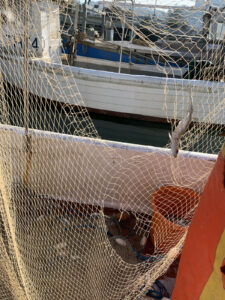
A seal-ravaged net – the entire net came back like this, having been in the water for less than an hour.
“There were several parties involved in the trials, including scientists and stakeholders from different areas, even from the salmon farms in Scotland. At first, we thought we were on the right lines. There might still be a hope through science.
“But in a relatively short time, the seals got to know that the pingers meant food.
“The researchers tried hard, and we welcome that. We understand that similar research was carried out in many other areas. The research helped, at least by acknowledging fishermen’s problems. But the fact remains that we require serious and immediate help to sustain our fishing businesses. The threat to our livelihoods from seals must be addressed, otherwise this might be our last year – it is as serious as that, and I understand that the same applies to many inshore fishermen all around the UK.
“We would welcome further research, but the question is whether they will ever defeat the link that seals have with fishing gear – that the presence of humans means easy food. In my opinion, it is almost impossible.
“Some seals now spend time at the bottom of Torquay harbour steps, and take the fish from the anglers’ lines before the fish are wound in.
“Sadly, and I never thought I would say this, there is no longer any chance for a small-boat fisherman from many South Devon ports to earn a living from the sea – even part of his living. The use of nets in a wide area of South Devon is almost over, and I have no doubt that the same is true in Dorset.
“Recently, one skipper working from a cove near Torquay hauled a tier of nets, and saw 12 seals attacking whatever was in the nets – 12 seals – and he landed nothing. Every fish was damaged, and his nets were ruined. The seal population that we see in this region is doubling, maybe trebling, each year.”
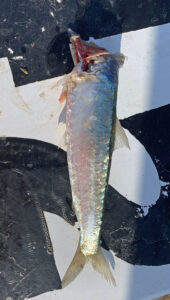
The remains of a pilchard after the seals had had a free meal.
Many seal supporters believe that the claims made by fishermen are exaggerated. Some contend that seals in the area are merely on passage, and are not a long-term threat to fishermen’s livelihoods.
But Trevor Parnell is close to coming ashore full-time, leaving his heritage of making a living from a small boat. He has already spent time working ashore at Brixham fishmarket.
He said: “Claims by some that the seals are just visiting the area, and are moving on, are just not true. We can easily identify seals. We know those seals better than they do, and we see new seals every year, and plenty of them, too.
“The skill that seals have in getting a free meal extends to salmon and sea trout too. In rivers like the Teign and the Dart, seals openly take fish at the weirs. They don’t eat the whole fish, but just kill for a small part of the fish, and they are not there in ones and twos, but often in droves waiting at the weir – those fish don’t have a chance. The stocks will eventually be wiped out by seals.
“From Dartmouth to Exmouth – which is a large area of inshore ground – it is no longer worth shooting any nets. Our coastal industry is almost finished. On the odd times when the seals are bothering fishermen elsewhere, and you feel safe to shoot the gear, by the time you haul those nets, both the fish and the nets are ruined.
“So many times, we haul gear and watch seals tearing into beautiful fish like grey or red mullet, ripping out only part of a fish and discarding the rest.
“Recently, we saw a huge shoal of mullet and expected to make a good wage, but myself and a crewman made a total of just £40 from what should have been a very profitable day – almost all the fish were ripped apart, and the nets were damaged beyond repair. I’ve lost count of the number of nets I have had to discard.
“We can understand why people who come to the coast love to see the seals, but they have never seen them in a feeding frenzy, as they often are when we are netting – not a pleasant sight, I can assure you.
“Seals can identify engine sounds, and every boat has a different sound. The minute that the engine is switched on, the seals know that free food might soon be available. You can see the wake as they follow. Once they have finished with that boat, they join other seals working on another boat. There is no let-up.
“My earnings have dropped from a good wage to one where the future looks bleak, to say the least.
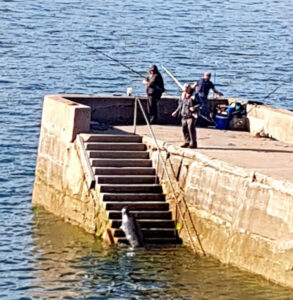
A mobile phone picture showing a seal actively waiting for anglers to provide it with a meal.
“All I can do is stick with potting and using traps for cuttlefish, and line-fishing for prime species, but even that is now under threat. I’m almost finished – the seals have nigh-on put me out of business – but what about the youngsters? We are hoping for youngsters to join the fishing industry – kids like James – but those youngsters wouldn’t live on the wages that we now get – £9,000 per year at best. It is no wonder there are no youngsters joining the present inshore fleet in South Devon.”
Matthew Ould owns two small boats, plus a larger vessel of 9.5m in length, the Courageous Spirit TH 156. He devotes a considerable amount of his time to his smaller boats – he’s devoted to coastal fishing in shallow water.
One might imagine that the Courageous Spirit would be seal-free, but Matthew told of repeated times, when ring-netting, that he and his crew lose significant earnings to seals. “All too often, as the ring-net is shot, the seals are on site; as the net tightens up, even more seal heads pop up. Those seals know exactly where to be and what to do. They happily eat as many sardines as possible, and eventually ruin the guard-meshes to escape, without a care in the world.
“On the small boats, there are so many losses to seals that I no longer go netting – the seals are even stealing bait from my pots. They are attacking everything we do – every possible means of making a living from static-gear fishing is under threat. If you are using 10in-diameter top entrances on the pots, the bait is gone in seconds of shooting the gear. We just cannot win.
“The only time we get any rest from seals is in their mating season – October and November. At Brixham, the seals get in under the fishmarket, and the males howl for a mate – an eerie sound. As soon as their season is over, back they come.”
I spoke to Darren Corbett, who with his son James is worrying about the future.
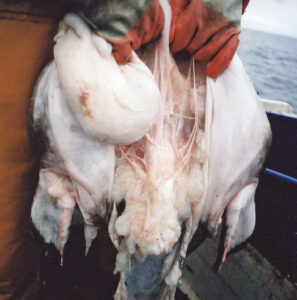
Cornish deep-water netters are losing considerable quantities of fish to seals – like this damaged monkfish landed by the Tracey Clare.
He said: “It doesn’t matter what time of day or night we fish, as soon as the seals hear the engine, they follow the boat wherever we go. Perhaps the seals are less trouble in deeper waters here – however, we are aware of the problems that the deep-water netters around Cornwall have. As far as seals are concerned, gill-nets mean food – it is as simple as that.
“We are not looking for total extinction of these seals, there just need to be sensible control measures. It’s similar ashore with foxes – there’s no longer any control of foxes, and farmers are losing significant sums of money from the damage that the increased number of foxes bring. There is a big colony of seals around Brixham, and before long we may have a similar-sized colony in Torquay, because the numbers around here are rising all the time.
“I can guarantee that as soon as I start the engine, a couple of seal heads pop up. As soon as you are in the fishing area and start shooting the net, up those heads pop again. Even before the end of the net is shot away, those seals are just ripping into the net.”
Here in Cornwall, the deep-water netters are losing significant money to seals, particularly the tangle-netters, and I regularly see skippers from the Helford river land more damaged monk tails than undamaged ones.
I phoned Jim Portus, head of the South Western FPO, whose area includes Torquay. He said: “Although we have no netters in the SWFPO and have not carried out any directed action on the problem, I have had several inshore fishermen tell me of their problems – serious problems.
“There is obviously a resident seal population around each port – seals that are causing more than just a nuisance. At the moment it is bad enough trying to make a living, without the heartbreak of pulling in your nets and finding that there are few if any undamaged fish, and that the nets have been ruined. It must be dreadful seeing their businesses ebbing away.
“What is yet to be discovered is what the seals will do now that there are few small inshore boats at sea [because of the Covid-19 situation]. Those seals will have to learn how to catch their own food, rather than have an easy life taking fish from the nets.
“Perhaps that will have a knock-on effect on the density of the seal colonies, because those seals have been having easy meals for a very long time. In any wildlife area, people are asked not to feed the animals, but in reality, that’s what fishermen like the Torquay lads are forced to do.
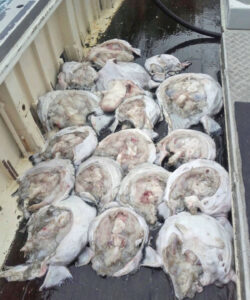
Monkfish from a Mevagissey boat last month, ripped apart for the liver.
“From such easy meals, the seal population in this area has been rising significantly, and the seals have no natural predators, so it begs the question of when there will be human intervention.
“We have had a badger cull, so maybe it is time for the government to consider a seal cull, and I don’t say that with any joy. We are all lovers of the ecosystem, and there is room in that ecosystem for both animals and humans to survive side by side, but not when animals such as seals are not controlled. At present, there is not a single factor of control on seals.”
Will the present chasm between fishermen and seal supporters ever be bridged? I doubt it, because here’s the introduction to The Seal Project’s website: “In 2018, we carried out a research project which identified negative human impact factors affecting wild grey seals at four locations within Torbay, Devon. The Seal Project was set up to monitor and reduce these impact factors and raise awareness of the importance of protecting this globally rare species.”
The introduction to its ‘Research Paper 2018’ adds: “Grey seals are:
- A globally rare iconic tourist
- attraction
- Our most reliably sighted marine
- wildlife attraction
- A top predator essential to maintain
- healthy thriving ecosystem balance
- A sentinel species alerting us to
- changes in the marine environment
- likely to affect us
- A positive stimulus on social health
- and well-being improvements as
- residents and visitors alike enjoy
- seeing ‘their’ seals.”

